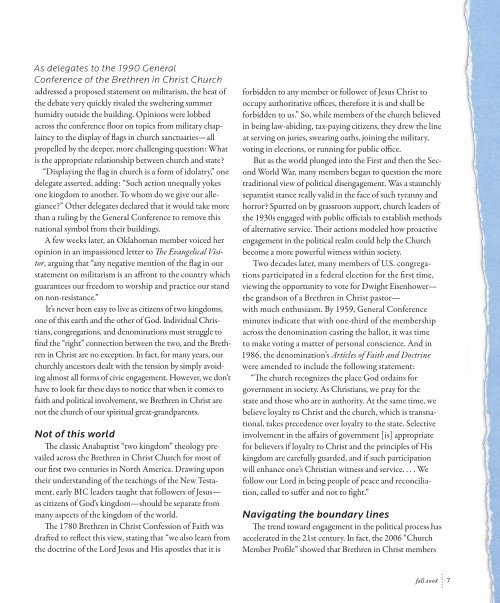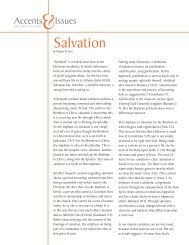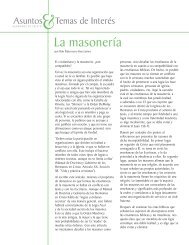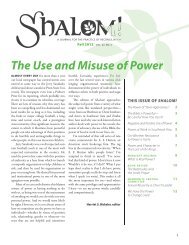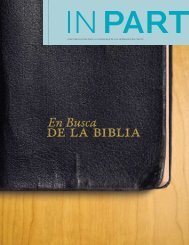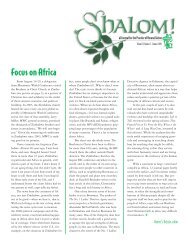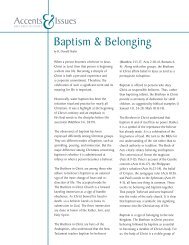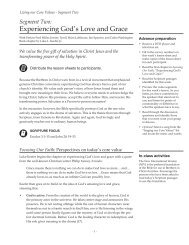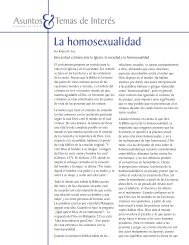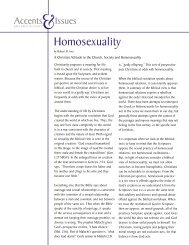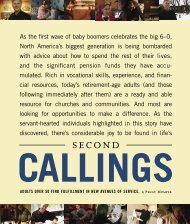Download - Brethren in Christ Church
Download - Brethren in Christ Church
Download - Brethren in Christ Church
Create successful ePaper yourself
Turn your PDF publications into a flip-book with our unique Google optimized e-Paper software.
As delegates to the 1990 General<br />
Conference of the <strong>Brethren</strong> <strong>in</strong> <strong>Christ</strong> <strong>Church</strong><br />
addressed a proposed statement on militarism, the heat of<br />
the debate very quickly rivaled the swelter<strong>in</strong>g summer<br />
humidty outside the build<strong>in</strong>g. Op<strong>in</strong>ions were lobbed<br />
across the conference floor on topics from military chapla<strong>in</strong>cy<br />
to the display of flags <strong>in</strong> church sanctuaries—all<br />
propelled by the deeper, more challeng<strong>in</strong>g question: What<br />
is the appropriate relationship between church and state?<br />
“Display<strong>in</strong>g the flag <strong>in</strong> church is a form of idolatry,” one<br />
delegate asserted, add<strong>in</strong>g: “Such action unequally yokes<br />
one k<strong>in</strong>gdom to another. To whom do we give our allegiance?”<br />
Other delegates declared that it would take more<br />
than a rul<strong>in</strong>g by the General Conference to remove this<br />
national symbol from their build<strong>in</strong>gs.<br />
A few weeks later, an Oklahoman member voiced her<br />
op<strong>in</strong>ion <strong>in</strong> an impassioned letter to The Evangelical Visitor,<br />
argu<strong>in</strong>g that “any negative mention of the flag <strong>in</strong> our<br />
statement on militarism is an affront to the country which<br />
guarantees our freedom to worship and practice our stand<br />
on non-resistance.”<br />
It’s never been easy to live as citizens of two k<strong>in</strong>gdoms,<br />
one of this earth and the other of God. Individual <strong>Christ</strong>ians,<br />
congregations, and denom<strong>in</strong>ations must struggle to<br />
f<strong>in</strong>d the “right” connection between the two, and the <strong>Brethren</strong><br />
<strong>in</strong> <strong>Christ</strong> are no exception. In fact, for many years, our<br />
churchly ancestors dealt with the tension by simply avoid<strong>in</strong>g<br />
almost all forms of civic engagement. However, we don’t<br />
have to look far these days to notice that when it comes to<br />
faith and political <strong>in</strong>volvement, we <strong>Brethren</strong> <strong>in</strong> <strong>Christ</strong> are<br />
not the church of our spiritual great-grandparents.<br />
Not of this world<br />
The classic Anabaptist “two k<strong>in</strong>gdom” theology prevailed<br />
across the <strong>Brethren</strong> <strong>in</strong> <strong>Christ</strong> <strong>Church</strong> for most of<br />
our first two centuries <strong>in</strong> North America. Draw<strong>in</strong>g upon<br />
their understand<strong>in</strong>g of the teach<strong>in</strong>gs of the New Testament,<br />
early BIC leaders taught that followers of Jesus—<br />
as citizens of God’s k<strong>in</strong>gdom—should be separate from<br />
many aspects of the k<strong>in</strong>gdom of the world.<br />
The 1780 <strong>Brethren</strong> <strong>in</strong> <strong>Christ</strong> Confession of Faith was<br />
drafted to reflect this view, stat<strong>in</strong>g that “we also learn from<br />
the doctr<strong>in</strong>e of the Lord Jesus and His apostles that it is<br />
forbidden to any member or follower of Jesus <strong>Christ</strong> to<br />
occupy authoritative offices, therefore it is and shall be<br />
forbidden to us.” So, while members of the church believed<br />
<strong>in</strong> be<strong>in</strong>g law-abid<strong>in</strong>g, tax-pay<strong>in</strong>g citizens, they drew the l<strong>in</strong>e<br />
at serv<strong>in</strong>g on juries, swear<strong>in</strong>g oaths, jo<strong>in</strong><strong>in</strong>g the military,<br />
vot<strong>in</strong>g <strong>in</strong> elections, or runn<strong>in</strong>g for public office.<br />
But as the world plunged <strong>in</strong>to the First and then the Second<br />
World War, many members began to question the more<br />
traditional view of political disengagement. Was a staunchly<br />
separatist stance really valid <strong>in</strong> the face of such tyranny and<br />
horror? Spurred on by grassroots support, church leaders of<br />
the 1930s engaged with public officials to establish methods<br />
of alternative service. Their actions modeled how proactive<br />
engagement <strong>in</strong> the political realm could help the <strong>Church</strong><br />
become a more powerful witness with<strong>in</strong> society.<br />
Two decades later, many members of U.S. congregations<br />
participated <strong>in</strong> a federal election for the first time,<br />
view<strong>in</strong>g the opportunity to vote for Dwight Eisenhower—<br />
the grandson of a <strong>Brethren</strong> <strong>in</strong> <strong>Christ</strong> pastor—<br />
with much enthusiasm. By 1959, General Conference<br />
m<strong>in</strong>utes <strong>in</strong>dicate that with one-third of the membership<br />
across the denom<strong>in</strong>ation cast<strong>in</strong>g the ballot, it was time<br />
to make vot<strong>in</strong>g a matter of personal conscience. And <strong>in</strong><br />
1986, the denom<strong>in</strong>ation’s Articles of Faith and Doctr<strong>in</strong>e<br />
were amended to <strong>in</strong>clude the follow<strong>in</strong>g statement:<br />
“The church recognizes the place God orda<strong>in</strong>s for<br />
government <strong>in</strong> society. As <strong>Christ</strong>ians, we pray for the<br />
state and those who are <strong>in</strong> authority. At the same time, we<br />
believe loyalty to <strong>Christ</strong> and the church, which is transnational,<br />
takes precedence over loyalty to the state. Selective<br />
<strong>in</strong>volvement <strong>in</strong> the affairs of government [is] appropriate<br />
for believers if loyalty to <strong>Christ</strong> and the pr<strong>in</strong>ciples of His<br />
k<strong>in</strong>gdom are carefully guarded, and if such participation<br />
will enhance one’s <strong>Christ</strong>ian witness and service. . . . We<br />
follow our Lord <strong>in</strong> be<strong>in</strong>g people of peace and reconciliation,<br />
called to suffer and not to fight.”<br />
Navigat<strong>in</strong>g the boundary l<strong>in</strong>es<br />
The trend toward engagement <strong>in</strong> the political process has<br />
accelerated <strong>in</strong> the 21st century. In fact, the 2006 “<strong>Church</strong><br />
Member Profile” showed that <strong>Brethren</strong> <strong>in</strong> <strong>Christ</strong> members<br />
fall 2008


